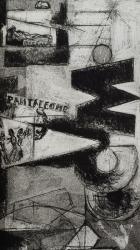Hecht, The Venetian Vespers.
The Venetian Vespers. [SIGNED – Limited Edition]. Etchings by Dimitri Hadzi.
First Edition. Boston, David R. Godine, 1979. 14 cm x 24.3 cm. Frontispiece. 25 pages. With black and white illustrations throughout. Original Hardcover with dustjacket in protective collector’s Mylar. Very good+ condition with only minor signs of external wear. Some minor wear to dustjacket only. Otherwise bright and clean. One hundred and sixty-five copies were designed and printed at Warwick Press, Easthampton, Massachusetts, by Carol J. Blinn. The type is Dante, composed by Michael and Winifred Bixler, Boston, and the paper is Falloden Ivory Laid. R.E. Townsend, Inc., Boston, printed the etchings on Rives Lightweight. The binding is by Gray Parrot, Hancock, Maine, with paste paper by Carol J.Blinn. Fifteen copied are hors de commerce. This is copy number 96. SIGNED by author on rear endpaper.
Anthony Evan Hecht (1923–2004) was an American poet. His work combined a deep interest in form with a passionate desire to confront the horrors of 20th century history, with the Second World War, in which he fought, and the Holocaust being recurrent themes in his work.
Hecht was born in New York City to German-Jewish parents. He was educated at various schools in the city – he was a classmate of Jack Kerouac at Horace Mann School – but showed no great academic ability, something he would later refer to as “conspicuous”. However, as a freshman English student at Bard College in New York he discovered the works of Wallace Stevens, W. H. Auden, T. S. Eliot, and Dylan Thomas. It was at this point that he decided he would become a poet. Hecht’s parents were not happy at his plans and tried to discourage them, even getting family friend Ted Geisel, better known as Dr. Seuss, to attempt to dissuade him.
In 1944, upon completing his final year at Bard, Hecht was drafted into the 97th Infantry Division and was sent to the battlefields in Europe. After the war ended, Hecht was sent to Japan, where he became a staff writer with Stars and Stripes. He returned to the US in March 1946 and immediately took advantage of the G.I. bill to study under the poet-critic John Crowe Ransom at Kenyon College, Ohio. Here he came into contact with fellow poets such as Randall Jarrell, Elizabeth Bishop, and Allen Tate. He later received his master’s degree from Columbia University. In 1947, Hecht attended the University of Iowa and taught in the Iowa Writers’ Workshop, together with writer Robie Macauley, with whom Hecht had served during World War II, but, suffering from post-traumatic stress disorder after his war service, gave it up swiftly to enter psychoanalysis.
Hecht released his first collection, A Summoning of Stones, in 1954. Even at this stage Hecht’s poetry was often compared with that of Auden, with whom Hecht had become friends in 1951 during a holiday on the Italian island of Ischia, where Auden spent each summer. In 1993 Hecht published The Hidden Law, a critical reading of Auden’s body of work. In his second book, The Hard Hours, Hecht first addressed his own experiences of World War II – memories that had caused him to have a nervous breakdown in 1959. Hecht spent three months in hospital following his breakdown, although he was spared electric shock therapy, unlike Sylvia Plath, whom he had encountered while teaching at Smith College.
Hecht’s main source of income was as a teacher of poetry, most notably at the University of Rochester, where he taught from 1967 to 1985. He also spent varying lengths of time teaching at other notable institutions such as Smith, Bard, Harvard, Georgetown, and Yale. Between 1982 and 1984, he held the esteemed position of Poet Laureate Consultant in Poetry to the Library of Congress. Hecht won a number of literary awards including: the 1968 Pulitzer Prize for Poetry (for The Hard Hours), the 1983 Bollingen Prize, the 1988 Ruth Lilly Poetry Prize, the 1989 Aiken Taylor Award for Modern American Poetry, the 1997 Wallace Stevens Award, the 1999/2000 Frost Medal, and the Tanning Prize. (Wikipedia)
- Keywords: American Poet · American Poetry · Catalogue – American Poetry of the 20th Century · Catalogue – Poetry of the 20th Century · Poems · Poet · Poetic works · Poetry · Poetry – Rare · poetry signed
- Language: English
- ISBN: 087923301X
- Inventory Number: 200449AB
EUR 680,--
© 2025 Inanna Rare Books Ltd. | Powered by HESCOM-Software













